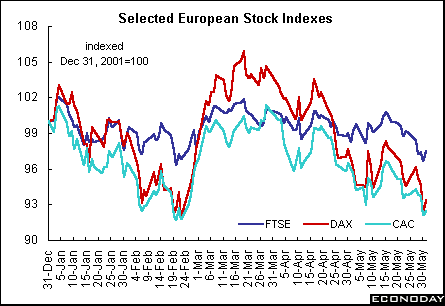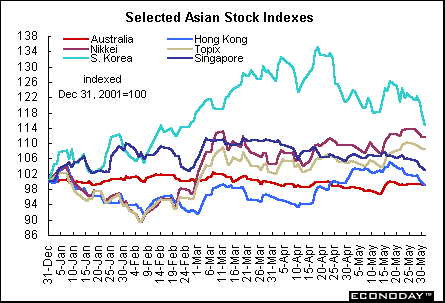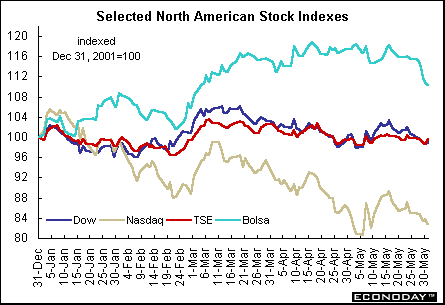Recap of global marketsEurope and BritainThe London FTSE, Paris CAC and Frankfurt DAX have had two dreadful months. All three indexes were up on the year at the end of the first quarter. Now none are. The FTSE has declined the least, losing 4.4 percent in April and May while the DAX has dropped 11.8 percent and the CAC 9.1 percent. The reasons for the declines are many yet they don’t differ much from those behind the weakness in Canada and the United States. Political uncertainties continue to worry investors, who are seeking safe-haven investments and are spreading their risk by diversifying geographically and by type of asset.  Last week was typical of second quarter malaise. Investors have decided that the U.S. recovery will slow from its torrid first quarter pace. As a result they are selling U.S. equities (and the dollar also). This is despite extremely weak GDP data from the European Monetary Union and Britain, where growth was virtually non-existent in the first quarter. In the EMU, growth came solely from exports, not domestic demand. The FTSE lost 1.6 percent on the week and the DAX and CAC lost 1.7 and 1.4 percent respectively. AsiaAsian equities indexes followed here have outperformed both Europe and North America. Three of the six Asian indexes — the Nikkei, Topix and the Hang Seng — have improved so far in the second quarter. The Nikkei and Topix have been rising because of government limitations on short selling combined with a leveling out in economic weakness thanks to increased exports to the United States. With investors looking for safe havens, foreign investment flows to Japan have increased. The Nikkei 225 stock average has climbed 11.6 percent this year, boosted by six straight weeks in which foreigners increased their Japanese stock holdings (data from the Tokyo Stock Exchange). Many foreign investors, who must first purchase yen to buy shares, are betting that Japan is rebounding from recession.  Indexes have been rising and falling on U.S. performance. This is especially true of exporting countries that rely on U.S. markets. Investors have been attracted to overseas markets in increasing numbers because they see that the U.S. might not grow as fast as investors wish. They are especially worried about the type of growth — inventory and consumer rather than a rebound in capital spending. Despite doubts over U.S. growth, the Topix index lost 1.7 percent last week and the Nikkei 225 stock average 1.8 percent. The indexes pared gains after Moody's Investors Service cut Japan's credit rating two notches to A2 and said the government's economic policies won't be enough to stem the nation's rising debt. Moody's had warned since February that it was considering such a move. AmericasWith the exception of the Mexican Bolsa, the Dow (down 1.0 percent since 2001) and Toronto S&P/TSX (down 0.4 percent) have fallen into negative territory in the last two months. The Bolsa cut its margin of growth since the end of 2001 from 15.5 percent at the end of March to 10.4 at the end of May. The Nasdaq’s losses deepened to 17.2 percent from 5.4 percent at the end of the first quarter. Aside from the continuing undercurrent of political uncertainty, investors have been afflicted by accounting and profit concerns. They have adapted the “I’m from Missouri” attitude of distrust, either not believing in or being skeptical about all company data thanks to Enron and assorted other accounting sagas. Despite positive economic data, investors have adopted a wait-and-see attitude. It is uncertain what will convince them that economic growth has revived after a short, shallow recession. Profits generally lag an upturn, given the write offs that traditionally are taken as firms cleanse balance sheets and expense accounts of excesses incurred during the previous growth period.  Last week was no help. Even after good economic data from both Canada and the United States, investors refused to believe. They wonder if great productivity data are ever going to translate into profits. |